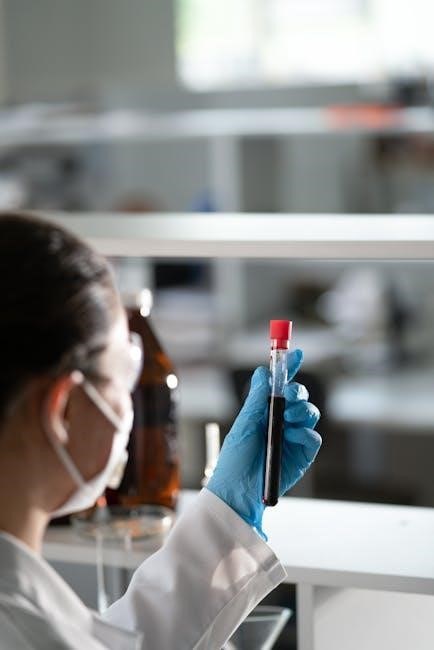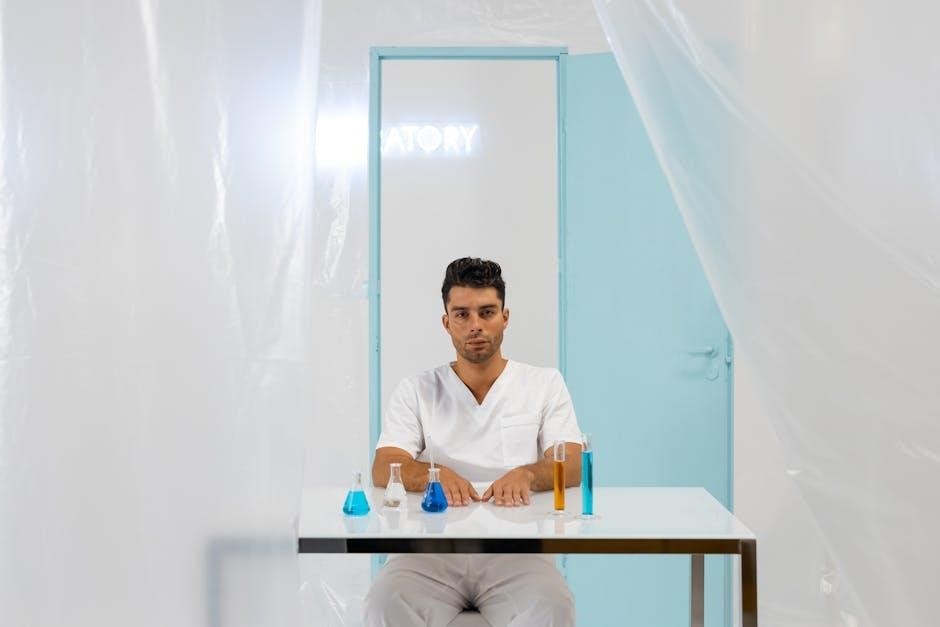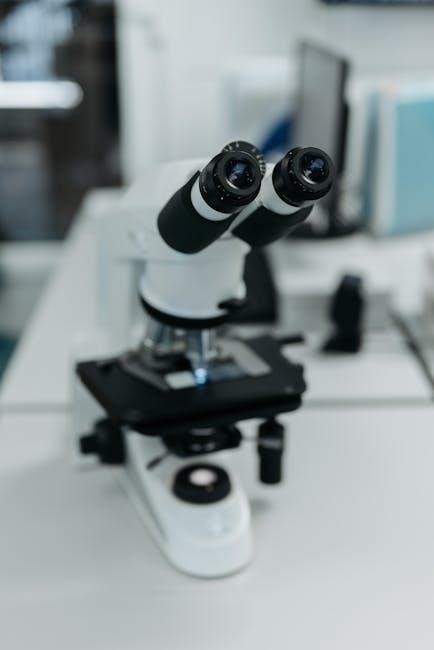Welcome to the Med Tech Study Guide! This comprehensive resource is designed to help aspiring medical technologists prepare for certification exams and excel in their careers. With practice exams, case studies, and study strategies, this guide ensures thorough preparation and confidence-building for the Medical Technologist (MT) exam. Start your journey to becoming a certified professional today!
1.1. Overview of Medical Technology
Medical technology involves the use of advanced diagnostic tools and laboratory procedures to analyze bodily fluids, tissues, and cells. It plays a critical role in disease detection, treatment monitoring, and patient care. Professionals in this field, such as medical technologists and laboratory technicians, conduct tests in areas like clinical chemistry, hematology, and microbiology. This guide provides a foundation for understanding the principles and practices of medical technology, ensuring a strong preparation for certification exams and real-world applications.
1.2. Importance of Preparation for Med Tech Exams
Preparation for Med Tech exams is crucial due to their challenging nature. Thorough study ensures understanding of clinical chemistry, hematology, and microbiology. Utilize practice tests, flashcards, and study guides to master concepts. Time management and familiarity with exam formats enhance performance. Regular review of laboratory procedures and case studies builds confidence. Stay updated with industry trends and leverage resources like AMT MLS practice tests for a competitive edge in certification and career advancement.
Education and Certification Requirements
Earning an Associate Degree in Medical Laboratory Technology from an accredited program is essential. Certification as an MLT or MLS through national exams like AMT or ASCP is required for professional practice.
2.1. Associate Degree in Medical Laboratory Technology
An Associate Degree in Medical Laboratory Technology (MLT) is a two-year program that combines classroom instruction with hands-on training. It covers foundational topics like clinical chemistry, hematology, and microbiology, preparing students for entry-level roles in laboratories. Accredited programs ensure eligibility for national certification exams, such as the MLT certification offered by the American Society for Clinical Pathology (ASCP). This degree is a critical first step toward a successful career in medical technology.
2.2. National Certification Exams (e.g., MLT, MLS)
National certification exams, such as the Medical Laboratory Technician (MLT) and Medical Laboratory Scientist (MLS) exams, are essential for career advancement. Administered by organizations like the American Society for Clinical Pathology (ASCP), these exams assess competency in laboratory procedures, clinical chemistry, and hematology. Preparation involves reviewing study guides, practicing with sample questions, and ensuring familiarity with exam formats. Eligibility typically requires an associate degree and completion of an accredited program. Staying updated with industry trends is crucial for success.

Key Areas of Study for Med Tech Exams
Focus on clinical chemistry, hematology, blood banking, microbiology, and immunology. Master laboratory procedures, instrumentation, and quality control. Understanding these areas ensures comprehensive exam preparation and professional competence.
3.1. Clinical Chemistry and Laboratory Procedures
Clinical chemistry focuses on analyzing bodily fluids to diagnose diseases. Study enzyme levels, electrolytes, and toxicology. Understand laboratory procedures, including sample collection, testing methodologies, and quality control; Familiarize yourself with instrumentation and troubleshooting techniques. Practice interpreting results and correlating them with patient conditions. Mastering these concepts is essential for accurate test outcomes and effective patient care in medical technology.
3.2. Hematology and Blood Banking
Hematology involves the study of blood and its disorders, such as anemia and leukemia. Focus on blood cell analysis, coagulation studies, and bone marrow examinations. Blood banking covers blood typing, cross-matching, and transfusion medicine. Understand safety protocols and blood component storage. Practice identifying abnormalities in blood smears and interpreting lab results. Mastery of these areas is critical for accurate diagnoses and safe transfusion practices in medical technology.
3.3. Microbiology and Immunology
Microbiology focuses on identifying pathogens like bacteria, viruses, and fungi through cultures, stains, and molecular tests. Immunology explores the body’s immune response and serological testing, such as antibody-antigen reactions. Understanding antimicrobial susceptibility and immune system disorders is essential. Practice case studies involving infections and immunodeficiencies to enhance diagnostic skills. This section ensures proficiency in lab techniques and interpretation, crucial for combating infectious diseases and immune-related conditions in clinical settings.
Practice Exams and Questions
Practice exams simulate real test conditions, helping you assess readiness and identify weak areas. Use sample questions to refine your knowledge and improve exam performance effectively.
4.1. Benefits of Using Practice Tests
Practice tests simulate real exam conditions, helping you build familiarity with the format and content. They identify weak areas, allowing targeted study and improvement. Regular practice enhances time management, reduces anxiety, and boosts confidence. By reviewing answers, you gain deeper insights into complex topics and refine your problem-solving skills, ensuring a more thorough preparation for the actual certification exam.
4.2. Sample Questions and Case Studies
This guide includes sample questions and detailed case studies to help you prepare for your Med Tech exam. The questions cover various topics, such as clinical chemistry, hematology, and microbiology, while case studies provide real-world scenarios to test your problem-solving skills. These tools help you identify knowledge gaps and improve critical thinking, ensuring you’re well-prepared for the challenges of the certification exam. Regular practice with these materials builds confidence and exam readiness.

Effective Exam Preparation Strategies
Develop a structured study plan, prioritize time management, and engage in active learning techniques. Utilize practice tests and review materials to enhance your preparation and confidence for the exam.
5.1. Time Management and Study Schedules
Effective time management is crucial for successful exam preparation. Create a structured study schedule, allocating specific time slots for each subject. Use flashcards to quickly review key concepts and set realistic daily goals. Prioritize challenging topics and limit distractions during study sessions. Regular practice with sample questions helps build confidence and familiarity with the exam format. Stay organized and consistent to ensure comprehensive preparation.
5.2. Utilizing Flashcards and Study Guides
Flashcards and study guides are powerful tools for efficient learning. Flashcards help memorize key terms and concepts quickly, while study guides provide in-depth explanations and practice questions. Use pre-made flashcards or create your own for challenging topics. Study guides offer structured review materials, ensuring comprehensive understanding. Combine these resources with active learning techniques to reinforce knowledge and stay prepared for exams. They are essential for mastering complex medical terminology and procedures.
Additional Resources for Med Tech Students
Explore recommended books, online tools, and professional organizations for in-depth learning. Utilize resources like Quizlet for flashcards, AMT study guides, and professional forums for networking and updates.
6.1. Recommended Books and Online Tools
Enhance your preparation with top-rated resources like the Medical Technologist Exam Study Guide and MLS Study Guide. Utilize online platforms such as Quizlet for flashcards and AMT’s practice tests. Websites like Study.com offer comprehensive review materials and interactive tools. Additionally, access the AMT Resource Library for guides and reference materials. These resources provide a well-rounded approach to exam prep and professional development in medical technology.
6.2. Professional Organizations and Forums
Join professional organizations like the American Medical Technologists (AMT) and American Society for Clinical Laboratory Science (ASCLS) for networking and resources. Engage in forums such as Reddit’s r/medicaltechnology for peer support and advice. These platforms offer access to study materials, job boards, and industry updates. Active participation in these communities can enhance your learning experience and provide valuable insights for exam preparation and career advancement in medical technology.

Staying Updated with Industry Trends
Stay informed about the latest advancements in medical technology through professional journals and industry forums. Automation, AI, and genetic testing advancements are reshaping the field. Regular updates ensure adaptability to new technologies and methodologies, keeping you competitive in this evolving profession.
7.1. Advances in Medical Technology
Recent advancements in medical technology include automation, AI-driven diagnostics, and genetic testing innovations. These technologies enhance accuracy, efficiency, and patient care. Staying updated on these trends through professional journals and industry forums is crucial for med tech professionals. Engaging with these advancements ensures adaptability to new methodologies and maintains competitiveness in the field. Continuous learning and integration of these technologies are essential for long-term success and effective patient outcomes.
7.2. Continuing Education Requirements
Continuing education is vital for med tech professionals to maintain certification and stay updated with industry advancements. Most certifications require periodic renewal through accredited courses or workshops. Professionals must complete a set number of continuing education credits (CEUs) within specified timelines. Resources like online platforms, professional organizations, and training programs provide accessible ways to fulfill these requirements. Regular engagement ensures compliance and enhances skill development, supporting both patient care and professional growth.

Tips for Long-Term Success in Med Tech
Stay current with industry trends, develop strong problem-solving skills, and maintain professionalism. Continuous learning, networking, and adaptability are key to thriving in the medical technology field long-term.
8.1. Building a Strong Knowledge Base
Building a strong knowledge base is the foundation of a successful career in medical technology. Master core concepts in areas like clinical chemistry, hematology, and microbiology. Utilize study guides, practice exams, and case studies to reinforce understanding. Stay updated on industry advancements and incorporate continuous learning into your routine. Networking with professionals and engaging in forums can also provide valuable insights. Dedication to lifelong learning ensures competence and adaptability in this dynamic field.
8.2. Networking and Professional Development
Networking and professional development are crucial for long-term success in medical technology. Join professional organizations like AMT or ASCLS to access resources, workshops, and mentorship opportunities. Attend conferences and engage in online forums to connect with peers and stay informed about industry trends. Volunteering and participating in continuing education programs can also enhance your skills and expand career opportunities. Building relationships and staying engaged fosters professional growth and keeps you competitive in the field.
Congratulations on completing the Med Tech Study Guide! You’re now well-prepared for your exams and a successful career in medical technology. Stay dedicated and keep learning!
9.1. Final Checklist for Exam Readiness
Ensure you’ve reviewed all chapters, completed practice tests, and used flashcards for key terms. Understand laboratory procedures and review case studies thoroughly. Confirm all material is covered, and take timed practice tests to simulate exam conditions. Review any weak areas identified during preparation. Stay calm, arrive early, and bring necessary materials. You’re ready to succeed!
9.2. Encouragement for Future Med Tech Professionals
Embark on this rewarding journey with confidence! Your dedication to becoming a skilled medical technologist will make a significant impact in healthcare. Stay focused, utilize the resources provided, and trust in your preparation. Remember, every challenge is an opportunity to grow. You are the future of this vital field—keep striving for excellence and making a difference in patients’ lives. Your hard work will pay off!
